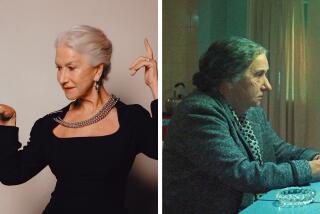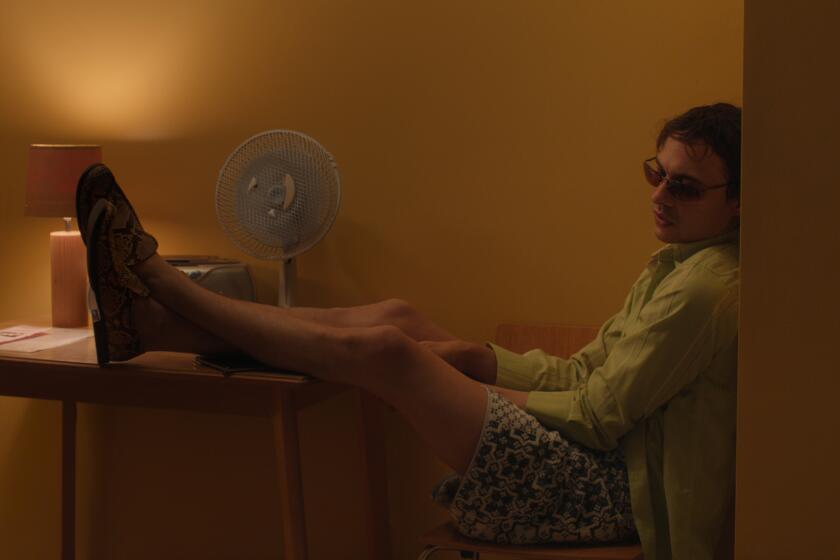Cinderella as the Original Spice Girl
- Share via
The urge to update the classics, to modernize all around, can be an overpowering one. After all, aren’t we the smartest, most sophisticated people who ever lived? Why shouldn’t we remake everything in our own image?
The well-meaning, erratic “Ever After,” starring Drew Barrymore as an empowered, post-feminist Cinderella, demonstrates that successful modernization is harder to pull off than it seems. While it’s difficult to dislike what this film tries to do, the way it does it is more problematic.
Why, the thinking went, should Cinderella be so darn passive, nodding off like Sleeping Beauty until a likely prince hits the neighborhood? Why not make her a fearless and liberated 16th century avatar of girl power who makes her own breaks and is smarter than everyone except, well, Leonardo da Vinci?
The idea is an excellent one, and Barrymore, an actress who radiates spunky good cheer, was the natural and appropriate choice to play “I gotta be me” heroine Danielle and many of the film’s effective moments can be credited to her spirited performance.
Though director Andy Tennant was enthusiastic about putting this kind of spin on Cinderella, his touch turns out to be counterproductive. Tennant’s sensibility, witness previous films “It Takes Two” and “Fools Rush In,” is on the sweetly sentimental side, and “Ever After” tends as well toward being too insistently endearing and pleased with itself.
After a brief mid-19th century prelude, in which an unnamed Grande Dame (a magisterial Jeanne Moreau) tells the brothers Grimm that they’ve got the Cinderella story all wrong, the film heads back in history to old France.
There we meet Danielle, a frisky and happy 8-year-old tomboy. But a twist of fate turns the girl into a sad-eyed orphan who spends the next decade doing chores for wicked stepmother Rodmilla (Anjelica Huston) and her two daughters, the conniving Marguerite (Megan Dodds) and the more amiable Jacqueline (Melanie Lynskey of “Heavenly Creatures”).
Meanwhile, handsome Prince Henry (Welsh actor Dougray Scott) is having difficulties of his own. Not interested in being defined by his position or marrying the Spanish princess his father the king has in mind, Henry wants “nothing more than to be free of my gilded cage.” Delighted when Da Vinci shows up to be a kind of artist-in-residence at court, he pleads with the great man to drag his father into the 16th century.
Henry and Danielle meet cute not once but twice. The first time, she knocks him off a horse with a well-aimed apple; the second she masquerades as a noblewoman to gain the freedom of a loyal servant.
Though he doesn’t recognize that it’s the same woman he’s dealing with, Henry is consistently charmed by this feisty young person who is always quoting from Sir Thomas More (“Utopia” is her favorite book) and lecturing him on his arrogant insensitivity whenever she has the opportunity.
“Ever After” tries to be amusing about this relationship, but the script (written by Susannah Grant and Tennant and Rick Parks) has trouble mastering a consistently funny tone. What it produces instead is glib, aren’t-we-cute dialogue that gives anachronistic lines, such as “Have you lost your marbles?” and “Sit down before you have a stroke,” a place of pride.
An allied difficulty is the film’s unaccountable idea that sentiments that would be ho-hum if said in modern dress--Henry’s gee-whiz “How do you do it, live each day with this kind of passion?” are somehow effective if delivered by people in costume. It ain’t necessarily so.
Counteracting all of this as much as any one actress can is Huston, who gives a thoroughly delightful performance as the troublesome stepmother. Arch, haughty and imperious, she adds the perfect spin to her dialogue and provides the kind of energy the film is fortunate to have.
This Cinderella does without a pumpkin, thank you very much, but it does have a glass slipper (designed by Salvatore Ferragamo) and it follows the familiar line of a prince falling in love with a phantom all the way through to what has to be called a fairy-tale ending.
While a modernization like this will clearly find favor with the self-esteem builders of the world, it’s hard not to notice that what’s on screen is lacking in the spark and brio (not to mention the language of Shakespeare) that made Baz Luhrmann’s snazzy updating of “Romeo & Juliet” so strong. Though it has its moments, “Ever After” never completely finds its footing, either in its century or our own.
* MPAA rating: PG-13 for momentary strong language. Times guidelines: some violence and hints of sexuality.
‘Ever After’
Drew Barrymore: Danielle
Anjelica Huston: Rodmilla
Dougray Scott: Prince Henry
Patrick Godfrey: Leonardo
Megan Dodds: Marguerite
Melanie Lynskey: Jacqueline
A Mireille Soria production, released by 20th Century Fox. Director Andy Tennant. Producers Mireille Soria, Tracey Trench. Screenplay by Susannah Grant and Andy Tennant & Rick Parks. Cinematographer Andrew Dunn. Editor Roger Bondelli. Costumes Jenny Beavan. Music George Fenton. Production design Michael Howells. Supervising art director David Allday. Set decorator Judy Farr. Running time: 2 hours, 2 minutes.
* Playing in general release throughout Southern California.
More to Read
Only good movies
Get the Indie Focus newsletter, Mark Olsen's weekly guide to the world of cinema.
You may occasionally receive promotional content from the Los Angeles Times.










